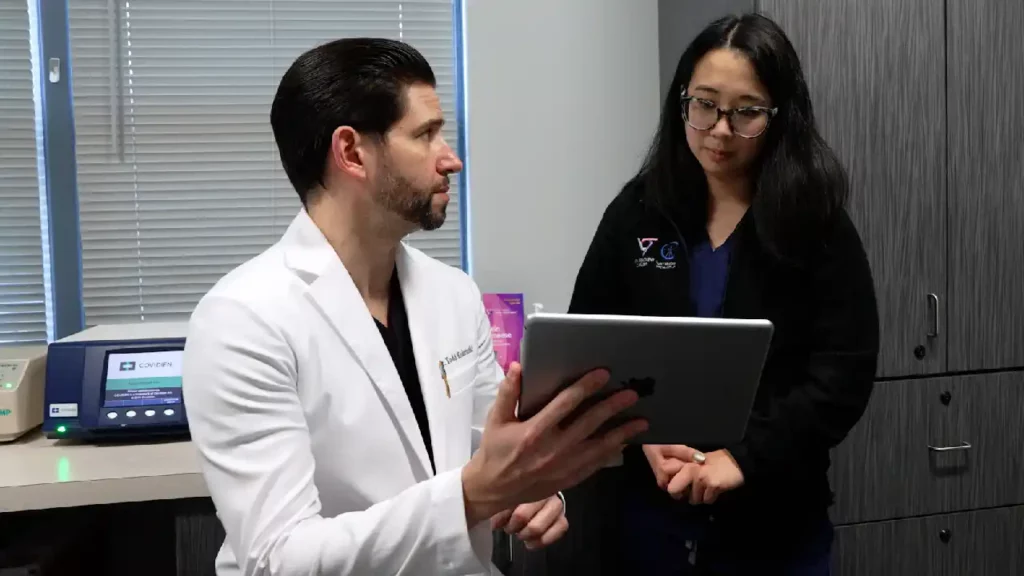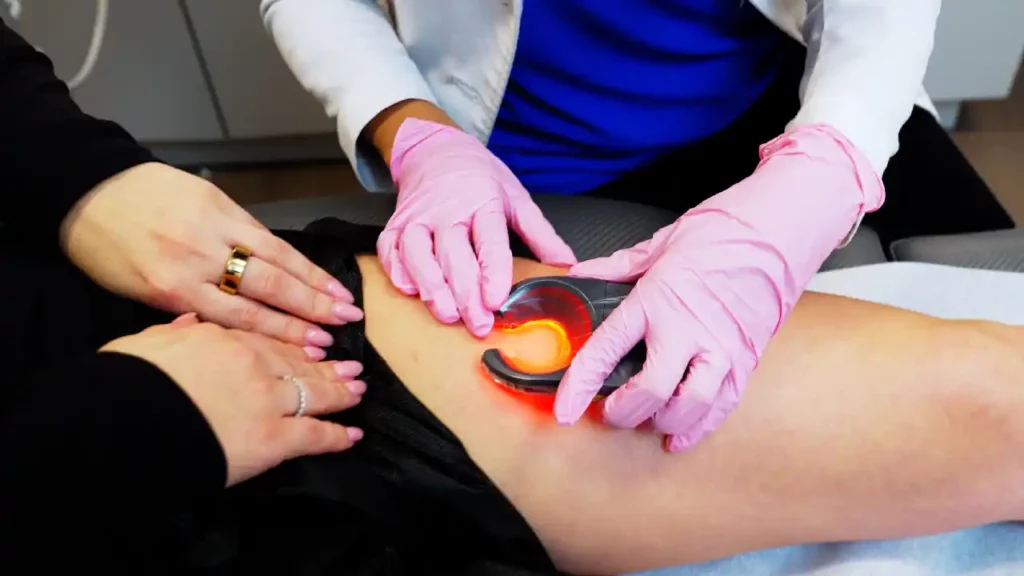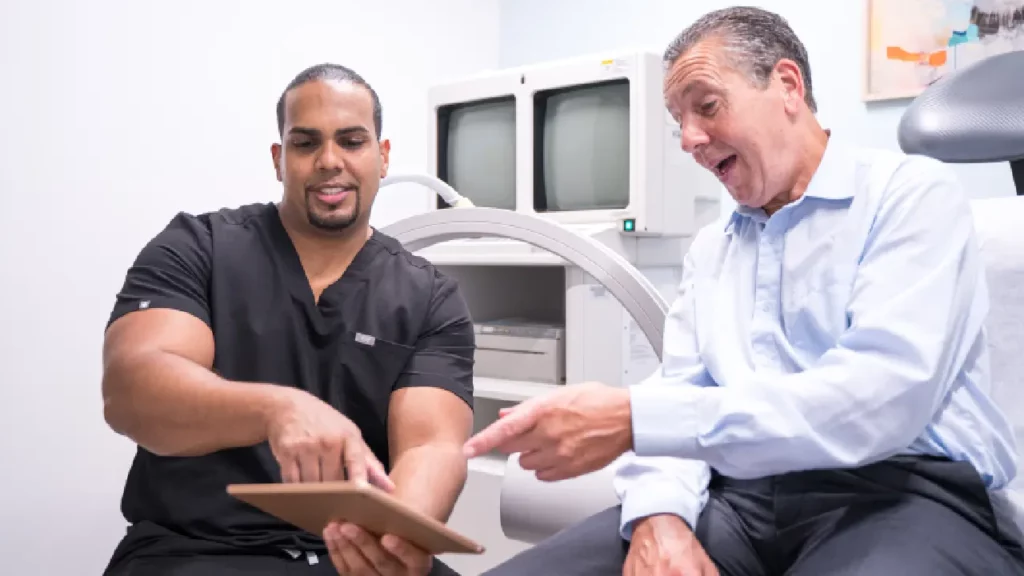The Best Foods for Vein Health: Nourish Your Circulation
Your veins play a crucial role in maintaining your overall health. They are responsible for carrying deoxygenated blood back to your heart and ensuring that nutrients are distributed throughout your body. However, as you age, your veins may become less efficient, leading to various vein-related issues such as varicose veins and chronic venous insufficiency. The good news is that you can promote vein health through your diet and other lifestyle changes. Diet and lifestyle changes can’t prevent vein issues and varicose veins, but they can reduce the risk.
The Vein Treatment Clinic is a group of state-of-the-art vein clinics led by board-certified vein doctors. We specialize in diagnosing and treating the root cause of vein problems and removing spider veins and varicose veins. If you have the signs and symptoms of vein disease, such as leg swelling, restless leg syndrome, leg heaviness, spider veins, and varicose veins, please schedule an appointment at your nearest vein clinic. Even if you don’t have vein conditions but are at high risk due to genetics, age, or lifestyle factors, you can consult our vein doctors to discuss appropriate strategies to reduce your risk of varicose veins.
In this article, we explore the best foods for vein health, helping you nourish your blood circulation and maintain healthy veins.
1. Dark Leafy Greens
Dark leafy greens such as spinach, kale, and Swiss chard are rich in essential nutrients like vitamin K, which plays a vital role in blood clotting. Additionally, these greens contain antioxidants like flavonoids that can help strengthen the walls of your veins, reducing the risk of varicose veins. Incorporating these vegetables into your daily diet can improve vein health.
Are you interested in getting more information about your condition or a treatment?
Fill the form below to start!
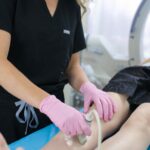
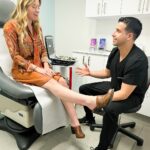

2. Berries
Berries, including blueberries, strawberries, and raspberries, are packed with antioxidants known as anthocyanins. These antioxidants can protect your veins from oxidative stress and inflammation, both of which can contribute to vein damage and poor circulation. Enjoy a handful of mixed berries as a snack, or add them to your morning cereal to boost your vein health.
3. Citrus Fruits
Citrus fruits like oranges, grapefruits, and lemons are renowned for their high vitamin C content. Vitamin C is essential for collagen production, a protein that provides strength and elasticity to your blood vessels. By consuming citrus fruits regularly, you can support the integrity of your veins and prevent them from becoming weak and prone to issues like varicose veins.
4. Fatty Fish
Fatty fish such as salmon, mackerel, and trout are excellent sources of omega-3 fatty acids. These healthy fats have anti-inflammatory properties and can help reduce the risk of blood clots and plaque buildup in your veins. Omega-3 fatty acids also contribute to improved circulation and can keep your veins functioning optimally.
5. Nuts and Seeds
Nuts and seeds like almonds, walnuts, and flaxseeds are rich in fiber, antioxidants, and healthy fats. The combination of these nutrients can help maintain healthy blood pressure and prevent inflammation in your veins. Snacking on a handful of nuts or adding them to your salads and smoothies is an easy way to incorporate them into your diet.
6. Garlic
Garlic has been used for centuries as a remedy for various health issues, including vein health. It contains allicin, which acts as a natural blood thinner and can improve blood flow. Incorporate garlic into your meals by adding it to soups, sauces, or stir-fries to support your vein health.
7. Beets
Beets are a unique addition to our list due to their high nitrate content. When consumed, nitrates are converted into nitric oxide in your body, which helps relax and dilate your blood vessels. This promotes healthy blood flow and can reduce the risk of clot formation. You can enjoy beets in salads, as a side dish, or in smoothies for a flavorful and nutritious boost to your vein health.
8. Water
While not a food per se, staying well-hydrated is crucial for maintaining healthy veins. Dehydration can lead to thicker blood, making it more challenging for your veins to circulate it effectively. Ensure you drink an adequate amount of water throughout the day to keep your veins lubricated and functioning optimally.
9. Red Grapes
Red grapes contain resveratrol, a powerful antioxidant that can help protect your veins from damage caused by free radicals. Resveratrol also has anti-inflammatory properties that can reduce the risk of inflammation in your blood vessels. Incorporate red grapes into your diet as a healthy and tasty snack, or include them in your fruit salads.
10. Turmeric
Turmeric is a spice known for its anti-inflammatory properties thanks to its active compound, curcumin. By reducing inflammation in your veins, turmeric can help prevent the development of varicose veins and promote better circulation. You can use turmeric in your cooking or enjoy it as a soothing cup of turmeric tea.
Other Ways to Improve Vein Health
While a balanced diet rich in vein-nourishing foods is essential for maintaining healthy circulation, there are several other strategies you can incorporate into your lifestyle to further improve vein health and reduce the risk of vein-related issues:
- Regular Exercise: Exercise plays a crucial role in promoting vein health by improving blood circulation, strengthening the muscles that support your veins, and helping you maintain a healthy weight. Activities like walking, swimming, and cycling can be particularly effective in enhancing blood flow and reducing the risk of venous insufficiency. Aim for at least 30 minutes of moderate-intensity exercise most days of the week to keep your veins in top shape.
- Compression Stockings: Compression stockings are a valuable tool for individuals with existing vein issues or those at risk. These specially designed stockings provide gentle pressure on your legs, helping to improve blood flow and prevent blood from pooling in your lower extremities. Consult your vein doctor to determine the appropriate level of compression and type of stockings for your needs.
- Avoid Prolonged Sitting or Standing: Prolonged periods of sitting or standing can strain your veins and lead to circulation problems. If your job or daily routine involves prolonged periods of immobility, take regular breaks to walk around, stretch your legs, and promote blood flow. Elevating your legs when possible can also improve blood flow to your heart.
- Weight Management: Maintaining a healthy weight is crucial for vein health, as excess body weight can put added pressure on your veins, especially in the lower extremities. Losing weight through a combination of a balanced diet and regular exercise can significantly reduce the risk of varicose veins and other circulation-related issues.
- Elevate Your Legs: Elevating your legs above heart level whenever possible can help reduce the strain on your veins and improve blood circulation. Lie down and prop your legs up with pillows, or use a leg wedge to elevate them while sleeping.
- Quit Smoking: Smoking is a significant risk factor for vein issues, as it can constrict blood vessels and reduce blood flow. Quitting smoking can improve circulation, lower your risk of developing varicose veins, and contribute to overall cardiovascular health.
- Avoid Tight Clothing: Wearing tight clothing, especially around the waist and thighs, can impede blood flow and put pressure on your veins. Opt for loose-fitting, comfortable attire to minimize constriction and allow for healthy circulation.
Vein Health FAQs
What are the common signs of vein problems?
Common signs include swollen and achy legs, visible spider veins or varicose veins, leg cramps, and skin discoloration. If you experience any of these symptoms, it’s essential to consult a vein specialist.
How do I know if I’m at high risk for vein problems?
You may be at high risk if you have a family history of vein issues, spend prolonged periods standing or sitting, are overweight, are pregnant, or have a history of vein problems like spider veins and varicose veins. Our vein doctors can assess your risk and provide guidance.
What happens during a vein assessment?
A thorough assessment typically includes a physical examination, a discussion of your medical history, and possibly imaging tests like ultrasound to assess your veins’ condition and function.
Are vein treatments painful?
Most vein treatments are minimally invasive and relatively painless. You may experience mild discomfort, but this can be managed with local anesthesia or numbing agents.
How long does recovery take after vein treatment?
Recovery times vary depending on the treatment method and individual factors. Generally, you can resume normal activities immediately after minimally invasive treatments, but strenuous workouts and heavy lifting should be avoided for a few days.
Can vein problems be prevented?
Yes, adopting a healthy lifestyle, maintaining a balanced diet, staying active, and avoiding prolonged sitting or standing can help prevent vein problems. Regular check-ups with a vein specialist can also identify early signs and risk factors.
Contact Us If You Have A High Risk of Vein Problems
Vein Treatment Clinic is committed to helping you maintain optimal vein health and address any concerns related to your veins. If you have a high risk of vein problems due to factors such as family history, age, or a sedentary lifestyle, contact our experienced team of vein specialists.





